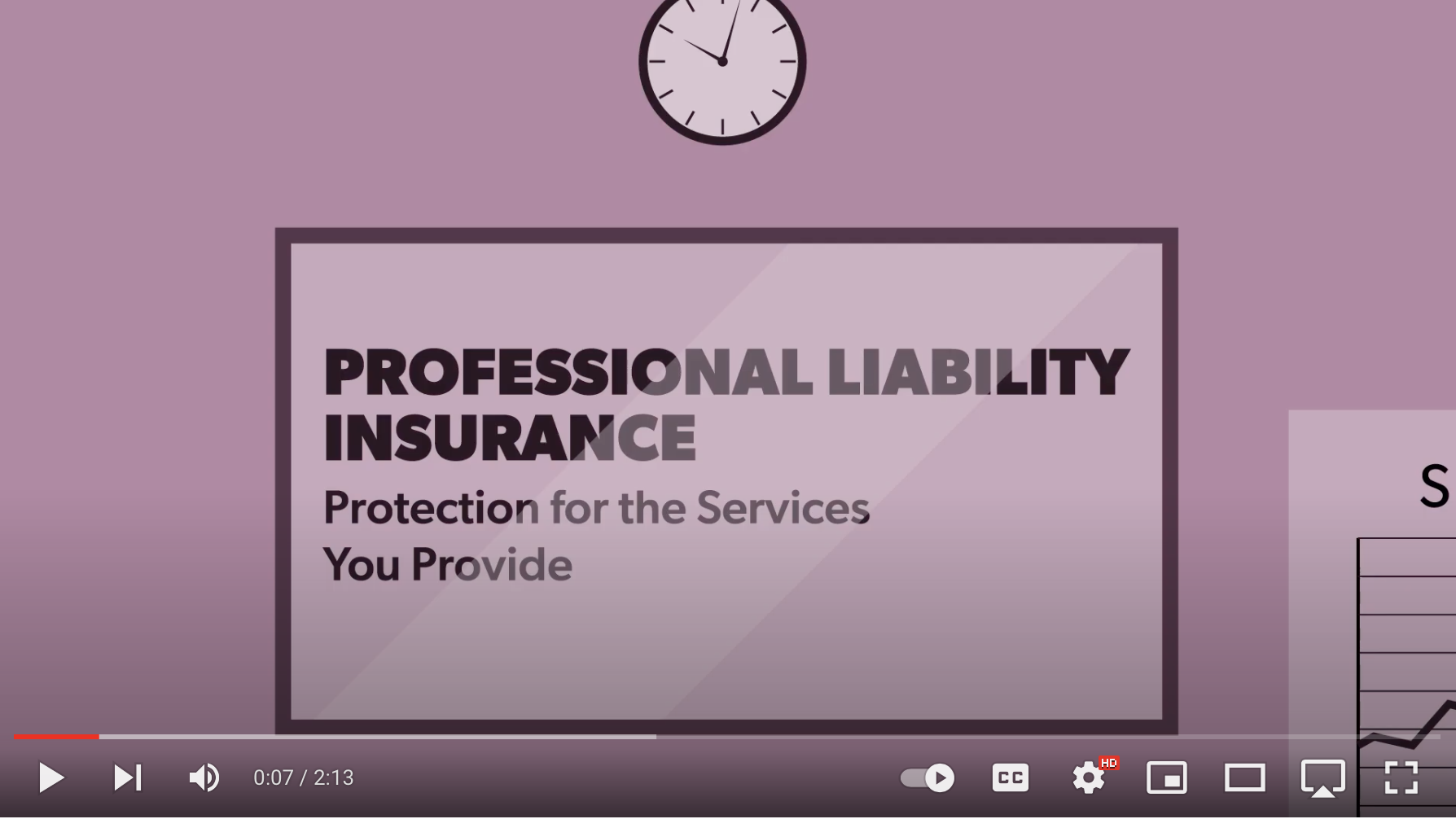What is professional liability insurance for small business?
What would happen if you made a mistake that unintentionally harmed a client? Professional Liability (MPL) insurance (also known as Errors & Omissions or E&O insurance) helps protect your small business from failure to uphold contractual promises in mostly service-based professions.
What does this actually mean for a small business like yours?
You may be more familiar with the terms “errors and omissions insurance” or “medical malpractice insurance,” both of which are used interchangeably with MPL insurance.
Professional Liability insurance pays for financial or economic damages to your customers or clients as a result of:
In the event you receive a lawsuit for damages, MPL insurance would pay for your legal defense and any damages awarded to the other party.
Professional liability explainer video
Small businesses need insurance.
Is Professional Liability the right coverage for you?
Find out in this overview video!

Securing small businesses with professional liability insurance
Don’t think you need professional liability insurance?
Consider a situation in which, during the normal course of running your small business, you make a mistake that impacts a client. You’d be held responsible for legal fees and damages unless you’re protected by errors and omissions insurance.
Similarly, if you’re working with a client who depends on you to fulfill a service by a concrete deadline and you miss the deadline, causing a negative impact to your client, your client can file suit against you.
Professional Liability insurance would cover your legal fees and any damages you owe, preventing you from going out of business.
This type of insurance is critical for any small business that provides services or works on a contractual basis.
To err is human. Even professionals with the best intentions can slip up, have a lapse in judgment, or simply forget something.
How does professional liability insurance work?
Where General Liability and Business Owners Policies protect against physical risks, Professional Liability insurance for small businesses covers liabilities arising from errors, omissions, and other wrongful acts as a result of your profession.
Professional Liability insurance is especially necessary for small businesses that:
Professional Liability insurance protects you from wrongful acts and economic damages not covered by GL insurance or a BOP, such as a failure to:
Depending on the industry, Professional Liability insurance may also be referred to as errors and omissions insurance, owing to its nature of protection against claims of mistakes, negligence, and oversights.

Small business insurance without the hassle.
Spending time answering question after question about your business just to obtain the insurance you need is simply a waste of time. That’s why we’ve made this process both seamless and stress free. Coterie offers Professional Liability insurance policies for small businesses that can be purchased on a monthly, or annual basis.
Common questions about professional liability insurance
Whether you’re a home-based business owner, run a micro small business, work as a contractor, own a startup, or fall into the many other types of small businesses, you have probably experienced first-hand the frustration of trying to find affordable coverage without having to jump through hoops. Check out these common questions that small businesses ask when it comes to Professional Liability insurance.
Most companies today utilize technology in some part of providing a service or product and need to take necessary precautions. To ensure your company is properly insured, you should conduct a full risk-management assessment. No one is more skilled at helping you identify and manage your risk exposures than a licensed independent insurance agent. If you don’t already have one, find an agent near you today.
E&O manages risks resulting from providing a product or service to a third party, which are not covered by a GL policy. Specifically, E&O protects your business in the event a third party suffers a financial loss due to your product or service not performing as it was intended or expected; this includes the event of an error or omission committed by your company. These policies also cover defense costs in the event of litigation. E&O coverage would apply in the following situations:
In all of these cases, GL coverage would not cover a claim or any litigation costs because of the presence of an error and the lack of resulting physical damage to the third party’s property. It should be noted that E&O policies usually exclude product recall, but some will accept damages for loss of use of a failed product.
Depending on your industry and level of licensing, credentialing, or training, you very well may need both types. The main difference between GL and PL is the risk exposure they cover for different types of lawsuits or allegations. If you work in a position where you’re exposed to more risks resulting from the quality of your advice, errors, or malpractice of your profession, consider Professional Liability insurance.
Small businesses who have special licensing, training, or credentials, and are worried about legal costs stemming from lawsuits regarding potential errors or omissions should consider Professional Liability insurance. Examples of professions include accountants, engineers, licensed beauticians, business consultants, and trainers. Some clients may specifically require you to provide a certificate of insurance to prove you carry this type of coverage.
Regulations and laws vary by state so be sure to check your state’s guidelines.
When buying professional liability coverage, there are considerations that will help you determine exactly what you need:
Professional liability coverage map
Learn more about our Professional Liability coverage across the United States

